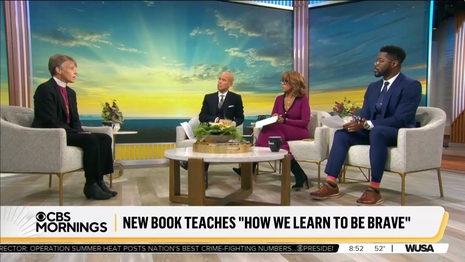 Despite overseeing a denomination that’s been cratering in support for its far-left views, celebration of genital mutilation, and downplaying the Word of God (among other things, making its Christian bona fides questionable), Episcopalian Bishop Marianne Edgar Budde was heralded on Thursday’s CBS Mornings for her new young adults book about bravery and her January scolding of President Trump at an inaugural interfaith service.
Despite overseeing a denomination that’s been cratering in support for its far-left views, celebration of genital mutilation, and downplaying the Word of God (among other things, making its Christian bona fides questionable), Episcopalian Bishop Marianne Edgar Budde was heralded on Thursday’s CBS Mornings for her new young adults book about bravery and her January scolding of President Trump at an inaugural interfaith service.
And, to make it even more palatable for the liberal hosts and viewers, Budde never mentioned God, His Son Jesus Christ, the Holy Spirit, or any character in the Bible as examples of bravery. Rather, Budde and the co-hosts focused on her selections of Martin Luther King Jr. and Harry Potter.
“Episcopal Bishop Mariann Edgar Budde was brave enough to tell President Trump to welcome refugees to America. She’ll tell us why she is bringing that lesson of bravery to kids in a new book,” gushed featured co-host Vladimir Duthiers in one of two teases.
Of course, the interview itself began with the snippet of her homily ripping into the President from the National Cathedral pulpit as xenophobic.
Co-host Nate Burleson reacted in triumph:
That was the leader of Washington’s Episcopal Diocese, Bishop Mariann Edgar Budde making a plea to President Trump during the Inaugural Prayer Service earlier this year. She writes about that moment in a new book for young readers. We Can Be Brave: How We Learn to Be Brave in Life’s Decisive Moments. She highlights examples from Harry Potter to Martin Luther King, Jr.
Duthiers had the first question, wondering why she “open[ed] the book writing that for you, ‘parenting was a master class in courage,’ this is directed to young people[.]”
Budde replied with the “our Creator” reference, replacing God’s name with a catch-all, feel-good term (click “expand”):
BUDDE: Well, to watch children grow up and to realize that nearly every day, they asked to do something they’ve never done before, from the beginning and it seems like our Creator has made us so that we can face thresholds of unknowing and things that we’ve never, ever been asked to do, and then we cross them, time and time again, so when they were very young, to when they were teenagers facing really hard things, I watched them, sometimes wanting to protect them and not being able to, seeing how they responded when they failed and got back up again, I think it’s one of the great privileges of parenting.
KING: Well, if they’re asked to do something, and I hadn’t thought about it until you put it in the book this way.
BURLESON: Right.
KING: Whether they are riding a bike or doing something they’ve never done before, young people are asked to do brave things all the time. So do you think that bravery or courage is taught, learned or is it something we are born with?
BUDDE: All of the above. All of the above.
KING: All of the above?
BUDDE: It’s clearly innate. It’s part of our — the way we are created to move towards things that we cannot do, and we learn it, and we’re inspired by others.
BURLESON: Yes.
BUDDE: Certainly, if we have people around us who encourage, whose life examples we follow, it is all of those things and that is one of the things I wanted to say. It’s a lifelong journey.
Burleson took a turn putting the ball on the tee: “[A]nother thing that you say, you write in the book, ‘accepting what we do not choose and cannot change is one of the most courageous decisions we make.’ I love that.”
Budde made the pivot to not-so-veiled activism, declaring “some of the most courageous people” are those who “made change started by accepting something and then making their life choices from there.”
Duthiers cited Dr. King as an example and what Budde dubbed “dangerous unselfishness.” This was where the only mention of anything remotely connected to the Bible came up with Duthiers noting Budde brought up the Good Samaritan (from the Gospel of Luke):
DUTHIERS: You know, one of the most moving chapters in the book is one where you talk about Dr. Martin Luther King, Jr. And you illustrate what he used to call dangerous unselfishness. And you use that to illustrate the Good Samaritan story. The Good Samaritan, where the two members of the clergy walk by a wounded man, and they say, if I stop to help this man, what will happen to me? But the Samaritan who is one of the most hated classes —
BUDDE: Hated people.
DUTHIERS: He says what?
BUDDE: He says, if I don’t stop to help this man, what will happen to him? And King used that as an example of his justification for going to be part of the sanitation worker strike in Memphis, which is where he was killed, because people didn’t want him to go. And he said, if I don’t go, what will happen to them?
BURLESON: Yes.
BUDDE: As opposed to, if I do go, what will happen to me.
Co-host Gayle King used the remaining time to focus on Budde’s lecturing of the President a day after his swearing-in:
If Budde’s message were so compelling like she’s been portrayed in the press, why is attendance and membership in the domination plummeting?
To see the relevant CBS transcript from October 16, click here.




